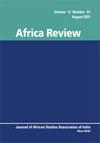Developmental State in Africa
IF 0.5
Q4 AREA STUDIES
引用次数: 0
Abstract
As various studies have uncovered, a significant number of states in Africa remain in abject poverty and are underdeveloped, long after the end of colonialism. These degrading economic conditions are further reinforced by authoritarian political cultures, unending instability and civil wars. The few exceptions include Botswana, South Africa and Mauritius. To stimulate national economic and social progress, African countries have experimented with different development models. In this paper, we compare the developmental state experiences of Ethiopia and Mauritius. A qualitative research approach was used, and the study is based entirely on an analysis of secondary data sources. The analysis proceeds by using comparative techniques. The findings of the study reveal that though the employment of the developmental state model resulted in growth in both Ethiopia and Mauritius, the way in which they instituted key policies and institutions of the developmental state has been quite different.非洲发展中国家
正如各种研究所揭示的那样,在殖民主义结束很久之后,非洲仍有相当多的国家处于赤贫和不发达状态。专制政治文化、无休止的不稳定和内战进一步加剧了这些有辱人格的经济状况。少数例外包括博茨瓦纳、南非和毛里求斯。为促进国家经济和社会进步,非洲国家尝试了不同的发展模式。本文比较了埃塞俄比亚和毛里求斯的国家发展经验。采用了定性研究方法,研究完全基于对二手数据源的分析。分析是通过比较技术进行的。研究结果表明,尽管采用发展型国家模式导致了埃塞俄比亚和毛里求斯的经济增长,但它们制定发展型国家关键政策和制度的方式却大不相同。
本文章由计算机程序翻译,如有差异,请以英文原文为准。
求助全文
约1分钟内获得全文
求助全文
来源期刊

Africa Review
AREA STUDIES-
CiteScore
1.80
自引率
12.50%
发文量
22
期刊介绍:
Africa Review is an interdisciplinary academic journal of the African Studies Association of India (ASA India) and focuses on theoretical, historical, literary and developmental enquiries related to African affairs. The central aim of the journal is to promote a scholarly understanding of developments and change in Africa, publishing both original scholarship on developments in individual countries as well as comparative analyses examining the wider region. The journal serves the full spectrum of social science disciplinary communities, including anthropology, archaeology, history, law, sociology, demography, development studies, economics, education, gender studies, industrial relations, literature, politics and urban studies.
 求助内容:
求助内容: 应助结果提醒方式:
应助结果提醒方式:


